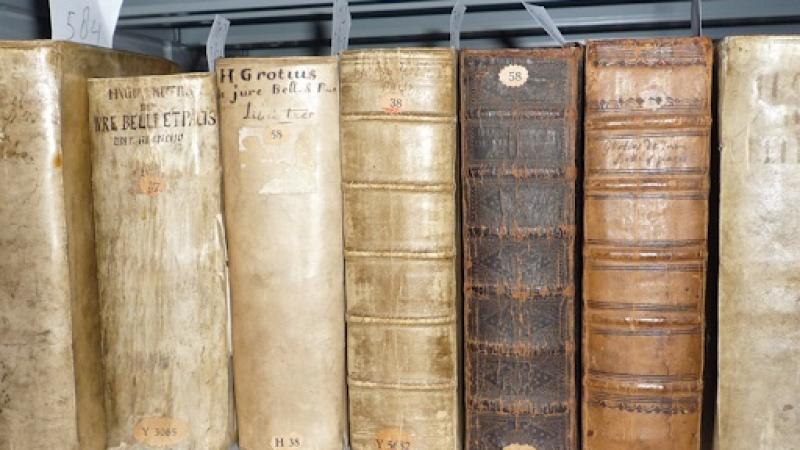
De Iure Belli ac Pacis libri tres (English: On the Law of War and Peace: Three books) is a work in Latin, written by Hugo Grotius and published in 1625 in Paris, on the legal status of war. It is now regarded as a foundational work in international law. Its content owed much to Spanish theologians of the previous century, particularly Francisco de Vitoria and Francisco Suarez, working in the Catholic tradition of natural law.
It is his most lasting work, begun in Loevestein State prison and published during his exile in Paris. It is a monumental effort, aiming to restrain conflicts between nations and religions on the basis of a broad moral consensus. Grotius wrote:
'Fully convinced ... that there is a common law among nations, which is valid alike for war and in war, I have had many and weighty reasons for undertaking to write upon the subject. Throughout the Christian world I observed a lack of restraint in relation to war, such as even barbarous races should be ashamed of; I observed that men rush to arms for slight causes, or no cause at all, and that when arms have once been taken up there is no longer any respect for law, divine or human; it is as if, in accordance with a general decree, frenzy had openly been let loose for the committing of all crimes.'
De Iure Belli ac Pacis advances a system of principles of natural law, which are held to be binding on all people and nations regardless of local custom. The work is divided into three books:
- Book I advances his conception of war and of natural justice, arguing that there are some circumstances in which war is justifiable.
- Book II identifies three 'just causes' for war: self-defense, reparation of injury, and punishment; Grotius considers a wide variety of circumstances under which these rights of war apply, and when they do not.
- Book III takes up the question of which rules govern the conduct of war once it has begun; influentially, Grotius argued that all parties to war are bound by such rules, whether their cause is just or not.
Various editions in the Library's collection
In 1914, the Hague publisher Martinus Nijhoff donated to the recently established Library of the Peace Palace a collection comprising 55 editions of De Iure Belli ac Pacis. The Nijhoff collection comprised editions in Latin, the original language of the publication, as well as in French, English, German and Dutch. Imprints ranged from 1625 to 1901. This donation was the starting point for the renowned Grotius collection.
The Library has a unique first print of the first edition of De Iure Belli ac Pacis. The book was finished in great haste to be in time for the Frankfurt Bookfair. As a result there had not been enough time to correct all pages and page numbering. This print also lacks indices and a table of contents. For specialists it is most interesting to compare this print with later corrected versions. The first edition consists of three groups of copies, to be distinguished according to changes that were made during the print run. Of those three states the Peace Palace Library purchased a copy (in 2010) that represents the first state, the black copy. This is an almost unique or at least a very rare copy, because among the books that have been identified as copies of the 1625 edition, only the copy previously owned by the English scholar John Selden (1584-1654) and now preserved in the Bodleian Library in Oxford, and another copy in the University Library of Salzburg are representatives of this state.
For more information, contact us at library@peacepalace.org.